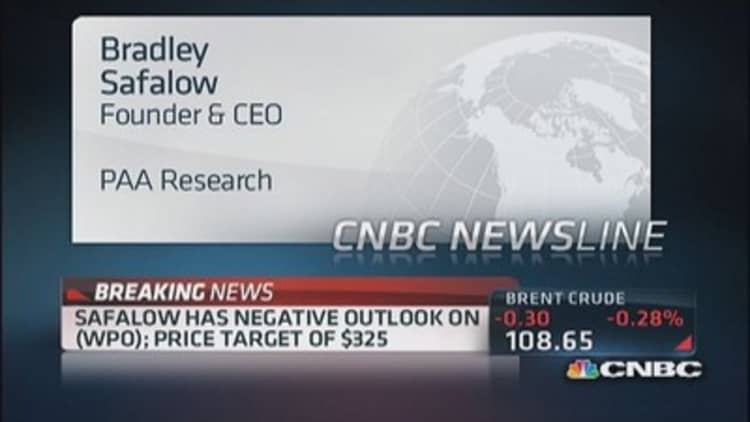
The sale of The Washington Post could mean a turning point for its parent company and a lack of profits for new owner Jeff Bezos of Amazon.com, Brad Safalow of PAA Research said Monday.
"Where the stock is trading now is kind of where I see it on a sum-of-the-parts basis," Safalow said. "However, what we have now is kind of a seminal event in the history of the company. There were a lot of people who advocated breaking this company up into its individual components for long time, and near views on what the residual asset value could be worth, especially in this environment, could be higher than what I've laid out here as a sum-of-the-parts value."
Shares of The Washington Post Co. closed at $568.70, up 1.56 percent.
Bezos agreed to buy the newspaper business for $250 million. The sale doesn't include other Washington Post assets such as Slate magazine, TheRoot.com or Foreign Policy.
(Read more: Amazon CEO Jeff Bezos buying the Washington Post)
Safalow, who is founder and CEO of PAA Research, said that the purchase price was "$200 million higher" than its breakup value, "so, there's more value in company today than there was yesterday."
The move to sell, he added, had not been expected from Washington Post CEO Donald Graham.

"This is certainly a surprising development, given that most people who know Don Graham personally never thought he would sell his 'baby,' so to speak in terms of the newspaper asset," he said.
Safalow noted that Graham had been close with Berkshire Hathaway's Warren Buffett, which might have spurred the Washington Post company toward diversification.
(Read more: Stock tips from Wall Street's favorite small firm)
"These recent acquisitions might suggest that the company is now going to be looking across a variety of verticals to allocate capital and ideally improve returns for shareholders," he said.
As for whether Bezos could turn the Post into a profitable business, Safalow said that might not be the Amazon.com founder's immediate goal.
"Without getting too specific about his managing capabilities, he certainly has a history of running companies at low levels of profitability," he added. "I don't think profits in this case are necessarily his primary motivation in the short-term. Will he figure something out? It is a strong brand."
(Read more: Stock market set to 'rip higher,' pro says)
But for a player in the struggling newspaper sector, the prospects were not stellar, Safalow said.
"I don't really see a scenario in which the Washington Post can be run as a profitable entity, but maybe that's not really his objective here," he added.
— By CNBC's Bruno J. Navarro. Follow him on Twitter @Bruno_J_Navarro.


